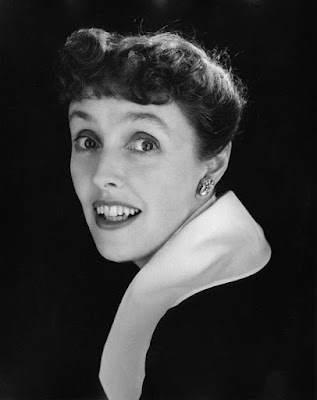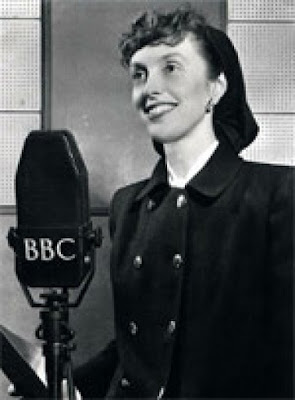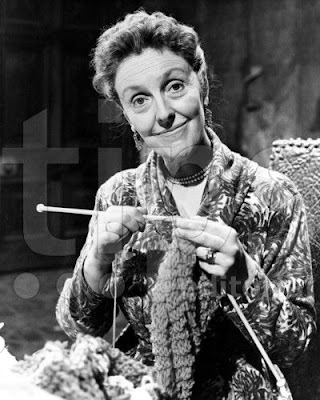Joyce Irene Grenfell, OBE (née Phipps; 10 February 1910 – 30 November 1979) was a British comedienne, who was the Queen of the comic monologue, and was an acclaimed comedy performer on stage, radio and television. She started her training at RADA in 1927, but left after six months, claiming "I think I lost interest in ![]() acting in plays because I found it too restrictive".
acting in plays because I found it too restrictive".
 acting in plays because I found it too restrictive".
acting in plays because I found it too restrictive".The daughter of a madcap socialite American mother, Nora Langhorne, and architect Paul Phipps, she was born Joyce Phipps in 1910. The niece of Nancy Astor, she spent a lot of her younger years at the Astor family home, Cliveden, and despite being born three quarters American, she is quintessentially English in character.
Joyce met her husband Reggie Grenfell, in 1927 and two years later they were married, living in a cottage on the Cliveden Estate lent by Aunt Nancy. It was whilst at a luncheon party at Cliveden that she met the editor of the Observer and told of how she listened to the radio during the day and was given the job of writing the first ![]() radio critic column in the paper, something she enjoyed for the next two years.
radio critic column in the paper, something she enjoyed for the next two years.
 radio critic column in the paper, something she enjoyed for the next two years.
radio critic column in the paper, something she enjoyed for the next two years.It was in 1939 when her performance debut took place. After meeting radio producer Stephen Potter at a party and amusing him with an impersonation of the speaker she had seen at a local Women's Institute meeting, she was persuaded to take part in a revue, The Little Revue, and it was a huge success.
She performed in a number of other revues in the West End before joining ENSA. Like many entertainers, she worked for ENSA during the war, performing in military hospitals and in 1942 toured the UK, with later tours of India and the Middle East. Her spot-on impersonations, characterizations and satirical songs became a big hit. One song ![]() "I'm Going to See You Today", which she herself wrote in 1942, became her signature song.
"I'm Going to See You Today", which she herself wrote in 1942, became her signature song.
 "I'm Going to See You Today", which she herself wrote in 1942, became her signature song.
"I'm Going to See You Today", which she herself wrote in 1942, became her signature song. For over thirty years she appeared in revues, on radio and in films, and it was with Stephen Potter (of Gamesmanship fame) that she wrote and performed in the How To Series for the launch of the Third Programme in 1946.
She was finally sought after for films, finding an opening playing gawky matrons in rollicking comedies. The best of the lot would include The Happiest Days of Your Life (1950), Laughter in Paradise (1951). Her most famous film role was as Sergeant Gates in the St Trinian's films in the 1950's. She continued to star in revues working with celebrities such as Noel Coward and Max Adrian. Her first solo act was called Joyce Grenfell Requests the Pleasure (1954) at the Fortune and St Martin's Theatre, which she eventually took to the USA.
Joyce wrote monologues, songs, and poems, working alongside Richard Addinsell for the musical accompaniment to her songs. She also put out highly popular comedy albums over the years. She continued to perform her monologues and songs until the late ![]() 1960's. Joyce's last performance was in 1973 before Queen Elizabeth and her guests at Windsor Castle.
1960's. Joyce's last performance was in 1973 before Queen Elizabeth and her guests at Windsor Castle.
 1960's. Joyce's last performance was in 1973 before Queen Elizabeth and her guests at Windsor Castle.
1960's. Joyce's last performance was in 1973 before Queen Elizabeth and her guests at Windsor Castle. Grenfell was also an avid letter writer and her friendship with Virginia Graham lasted for 62 years until her death.. The two were inseparable, and when they were apart, wrote daily. The letters were undiscovered until 1995, and give a whole social narrative as they discuss everything from war to politics, as well as the more private and emotional lives behind the comic performances.
Her health began to fail soon after. An eye infection resulted in a loss of sight in one eye and she was forced to retire. Six years later the eye was diagnosed as cancerous and, though it was removed, she continued to decline, dying on November 30, 1979 at home.
(Info edited from Wikipedia, IMDB, Bristol.ac.uk & britishcomedy.org)
